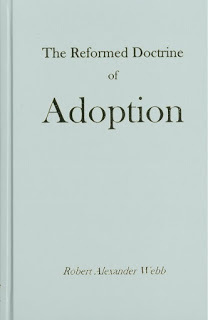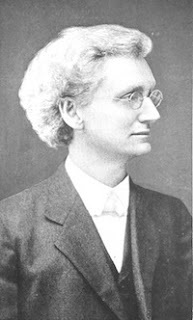Classic Book Review: R.A. Webb and The Doctrine of Adoption

R.A. Webb's, The Doctrine of Adoption, is a rare gem to be found in the house of many mansions within the Kingdom of God. This thin, nondescript volume deals compactly and definitively with a doctrine that is too often neglected or only been given a passing reference to in the running centuries of church historical thought. Webb rectifies this theological lapse with uncanny precision and stylistic rhetoric that is both simultaneously simple and elegant .
The main issue that Webb exegetes is our standing before God the Father before and after regeneration in believers through the atoning sacrifice of Christ on the cross. Are we now sons who cry, "Abba, Father?" or are we also bondservants who have been set free from the bondage of sin and slavery which we are all born into because of Adam and Eve's disobedience? Or are we both? And, if so, what determines and delineates each in the eyes of God as revealed in Scripture?
Perhaps the most comprehensive treatment of this problem is in Christ's own words when he dealt with Pharisees in John 8: 31-47 which bears reproducing in full here from the NIV:
To the Jews who had believed him, Jesus said, “If you hold to my teaching, you are really my disciples. Then you will know the truth, and the truth will set you free.”
They answered him, “We are Abraham’s descendants and have never been slaves of anyone. How can you say that we shall be set free?” Jesus replied, “Very truly I tell you, everyone who sins is a slave to sin. Now a slave has no permanent place in the family, but a son belongs to it forever. So if the Son sets you free, you will be free indeed. I know that you are Abraham’s descendants. Yet you are looking for a way to kill me, because you have no room for my word. I am telling you what I have seen in the Father’s presence, and you are doing what you have heard from your father.” “Abraham is our father,” they answered.“If you were Abraham’s children,” said Jesus, “then you would do what Abraham did. As it is, you are looking for a way to kill me, a man who has told you the truth that I heard from God. Abraham did not do such things. You are doing the works of your own father.”“We are not illegitimate children,” they protested. “The only Father we have is God himself.”Jesus said to them, “If God were your Father, you would love me, for I have come here from God. I have not come on my own; God sent me. Why is my language not clear to you? Because you are unable to hear what I say. You belong to your father, the devil, and you want to carry out your father’s desires. He was a murderer from the beginning, not holding to the truth, for there is no truth in him. When he lies, he speaks his native language, for he is a liar and the father of lies. Yet because I tell the truth, you do not believe me! Can any of you prove me guilty of sin? If I am telling the truth, why don’t you believe me? Whoever belongs to God hears what God says. The reason you do not hear is that you do not belong to God.”At first glance, this passage seems to be explaining the concept of sonship only but if we examine it more carefully, Christ also deals with servantship. Let's look at how Webb distinguishes between the two.
Strictly speaking, all of us, whether we are believers or not, are sons of God by causation as the Pharisees in the above passage correctly maintained by way of their physical birthright from Abraham and his descendants. Webb derives from Scripture and logic that this causative, or traducianist, belief really extends further back than just Abraham but all the way to the Garden and to Adam and Eve. Christ implies this by His statement in verse 34 when He says, "everyone who sins is a slave to sin." Certainly, you must agree that sin did not begin with Abraham but with Adam. Therefore, because of the first man's disobedience, everyone is born causatively into sin which the Psalmist affirms: "Surely I was sinful at birth, sinful from the time my mother conceived me." (Psalm 51:5) But the question remains, if man was created in God's image, then how can such a creature sprung from the very loins of God's will be imperfect potentially? How much of the Divine nature, if any, was imputed to man at his formation from dust? If God breathed His spirit into man to give him life, how could that pure and Holy Spirit become corrupt? Doesn't that imply that God can be corrupt also? Here is where the difficulty lies and where Webb finely navigates the different theories, identifying each one and eliminating wrong premises using impeccable logic and comparative rhetoric as skillful techniques.
And as Christ interweaves sonship and servantship in the John 8 passage above (which completely went over the heads of the Pharisees), Webb masterfully dissects the two in this book and shows how, in effect, man is both servant and son, first falling from God's favor through sin (yet remaining causatively related) but then through justification, atonement and regeneration, becoming heirs and adopted children.
The fine details of Webb's theological logic is far too dense and detailed to be dealt with in a book review, but this partial summary of the key concepts in the last chapter of The Doctrine of Adoption may serve to whet the thinking man's appetite and to purchase this rare, collectible for only ten lousy dollars via the private store's website linked above in the opening line of this post. And I leave you with these pearls of wisdom in Webb's own words and rhetorical style, gentle reader, after he had thoroughly dealt with the Doctrine of Adoption which many of the 'greater' theologians in church history who have avoided or treated only nominally in their works:
Let us keep these two ideas separate: Jesus died to reconcile God to men; the Spirit was granted to reconcile men to God. The atonement made God a Father; the Spirit makes man a son. Christ's work is subjective to God, but objective to men; the Spirit's work is objective to God, but subjective to men. Christ does for us; the Spirit does in us. Jesus baptized no man; all true baptism is by the Holy Spirit; for the Son, that God might be made a redemptive Father; for the Spirit, that man might be made a redemptive son. There are two terms to every relation; and the two terms of this particular relation are God and man. Each is angry with the other; each must be placated. It is the office of Christ to placate the Father; it is the office of the Spirit to placate the sinner. The technical name for the power by which the Spirit applies the benefits of Christ's redemption is Grace (179).
 Robert Alexander Webb
Robert Alexander Webb1856-1919
Published on January 20, 2020 00:54
No comments have been added yet.
Conrad Johnson's Blog
- Conrad Johnson's profile
- 47 followers
Conrad Johnson isn't a Goodreads Author
(yet),
but they
do have a blog,
so here are some recent posts imported from
their feed.



